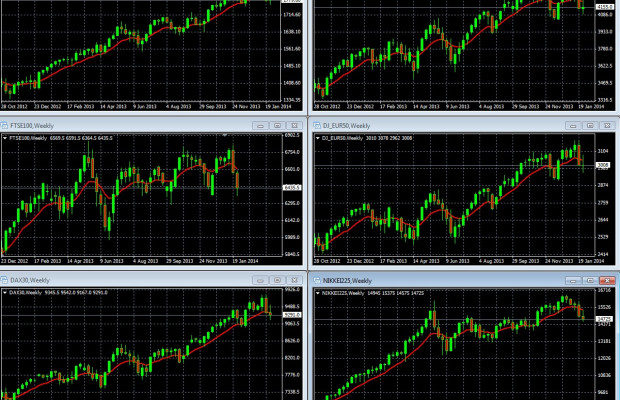Lessons for the coming market week from the US for traders and investors in stocks, indexes, forex and other global markets, AND the secret advantage that got the Seahawks and Broncos to the Super Bowl
The following is a partial summary of the conclusions from the fxempire.com  fxempire.com ’ meeting in which we cover the key lessons learned for the coming week and beyond.
Overall Technical Picture: The State Of The Global Rally
Before delving into the lessons for the week, for the sake of context it’s helpful to see that the long term uptrend in global indexes is clearly starting to buckle, and in some cases, is already broken.

SAMPLE US, EUROPE, ASIA WEEKLY CHARTS OF LARGE CAP GLOBAL INDEXES WITH 10 WEEK/200 DAY EMA: LEFT COLUMN TOP TO BOTTOM: S&P 500, FTSE 100, DAX 30 RIGHT COLUMN: CAC 40, DJ EUR 50, NIKKEI 225
02 Feb 02Â
Â
As we can see from the chart above, while the uptrend dating from Q4 2012 is still safely intact, the later leg up in the uptrend dating from June 2013 is at or near the breaking point. Both the sample US and European indexes closed their first down month since August, and Japan had its first drop since October, its first material decline since August. Although the more gently sloping uptrends from late 2012 are still safely intact, the stronger uptrends since the summer of 2013 are close to violating their upward trend lines, and the FTSE 100 has already done it.
We’ll look at the fundamental drivers behind this pullback, and other lessons from the past week’s market action, below.
Â
US
Here’s what we learned from US developments.
Taper On: FOMC Stays The Course & Ramifications
As expected, the Fed continued with its $10 bln/month cut in bond purchases Wednesday. Although the move was no surprise, markets disliked it, perhaps too many hoped that overseas troubles would cause a pause. That view has some justification, regardless of recent Fed indications that overseas events don’t influence its policy. Even a casual study of Fed behavior during the GFC says otherwise, and rightly so – global problems can quickly become domestic problems.

